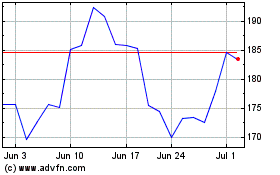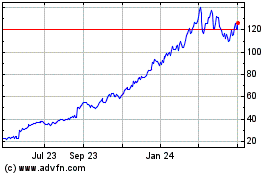Boeing Co. clinched a deal to sell 80 jetliners to Iran,
completing the first major agreement between a U.S. company and the
Islamic Republic, just as the political winds are changing.
Planned aircraft sales by Chicago-based Boeing and European
rival Airbus Group SE to Iranian carrier Iran Air are among the
most high-profile transactions signed since Iran and Western powers
concluded a nuclear accord that removed sanctions on Tehran. U.S.
officials cleared the way for Airbus and Boeing to start contract
talks in September.
Now, Western executives are trying to figure out whether
President-elect Donald Trump will step in to slow, or stop, the
tentative approaches many companies have already made.
The Boeing deal was first announced in June and officially
sealed between Boeing and Iran on Sunday. It is valued at $16.6
billion, based on the company's list price, which doesn't include
typical discounts. Airbus has a similar deal for jet sales to Iran
pending.
The timing of the final announcement is awkward, given how the
aerospace giant's relations with the president-elect were strained
last week when he criticized the potential cost of replacing the
jets that serve as Air Force One. A Boeing spokesman declined to
comment on whether it informed the incoming administration about
the progress of the Iran sale, but the company said in a written
statement that the deal has the potential to sustain thousands of
U.S. jobs. It has also said it will work with Mr. Trump on the cost
of the Air Force One deal.
Boeing's Iran Air sales, because they involve a state-owned
airline, require approval from the U.S. Treasury, State Department
and Congress mainly linked to any potential financing arrangements,
said people familiar with the sales process. This presents new
potential obstacles to any transaction should Mr. Trump, an
outspoken critic of the Iran deal, oppose these kinds of commercial
openings with Iran.
An aide to Rep. Peter Roskam (R., Ill.), a critic of the Boeing
deal, said it is likely Congress will oppose the deal next year and
that the new administration is expected to block the aircraft
transaction rather than force lawmakers to act.
Officials with the Trump transition team didn't respond to a
request for comment about the Boeing aircraft sale to Iran.
Despite new wariness after the election of Mr. Trump, many big
and small Western companies continue to move ahead with early plans
to enter Iran. German conglomerate Siemens AG, French oil giant
Total SA, French telecommunications firm Orange SA and British
telecom giant Vodafone Group PLC are all among other big Western
companies pursuing their own deals, with varying degrees of
investment commitments.
Still, many have held back on big commitments. Royal Dutch Shell
PLC, for instance, signed a deal last week to cooperate broadly in
the energy sector with Tehran, but didn't commit to any specific
investment.
Amid the transition in Washington, executives are likely to
forgo the sort of specific, investment-heavy deal that might be
unwound should Mr. Trump or Republican lawmakers turn against the
commercial openings that have followed the nuclear deal.
"Iran is a big market and there's potential there, but we're not
sure how the sanctions are going to go," said Anubhav Singh, the
head of global sales and marketing at Afripipes, a South African
telecommunications-equipment company exploring an entry into Iran.
"We are being cautious and seeing how things pan out in the next
five or six months."
Abercrombie & Kent Co., a luxury travel agency based near
Chicago that recently began offering $5,695 guided tours of Iran
for Americans, isn't planning a post-election pullback. It will
react in response to changes in government policy, spokeswoman
Pamela Lassers said.
"We are hopeful that President-elect Trump's extensive business
and hospitality background will make him receptive to the value of
the travel industry," she said.
The Boeing deal covers 15 of the company's 777-300ER long-haul
jets and 15 of the newer 777X widebody aircraft under development,
as well as 50 737 Max single-aisle jets. Boeing had said it might
need to trim production of the existing 777 jet unless it won fresh
orders.
Boeing has more than 5,700 jet orders valued at almost $500
billion, though the company needs to secure more deals for its the
777-30ER to avoid production cuts after a recent slowdown in deals.
It also wants to avoid ceding market share to Airbus in Iran, where
pent-up demand for domestic travel could mean the country might
need as many as 400 new, more-efficient planes.
Iran's transport minister, Abbas Akhoundi, said the deal was
"the first step for the renovation of the country's aviation
fleet," and would soon be followed by concluding talks with Airbus,
according to Iranian state news agency IRNA.
For Iran Air, replacing planes is a priority. After years of
sanctions, some imposed after the Iranian revolution in 1979, the
carrier operates some of the world's oldest airliners.
Airbus in January agreed to sell 118 planes to Iran Air in a
deal valued at roughly $25 billion at list price. Airbus on Sunday
declined to comment about talks with potential customers.
The Obama administration has encouraged the Boeing deal and
others as part of a series of moves to cement its Iran policy,
which has the nuclear agreement as its centerpiece. Mr. Trump has
called the pact a bad deal and said the U.S. gave up too much for
too little in return.
Doug Cameron and Carol E. Lee contributed to this article.
(END) Dow Jones Newswires
December 11, 2016 21:35 ET (02:35 GMT)
Copyright (c) 2016 Dow Jones & Company, Inc.
Abercrombie and Fitch (NYSE:ANF)
Historical Stock Chart
From Mar 2024 to Apr 2024

Abercrombie and Fitch (NYSE:ANF)
Historical Stock Chart
From Apr 2023 to Apr 2024
